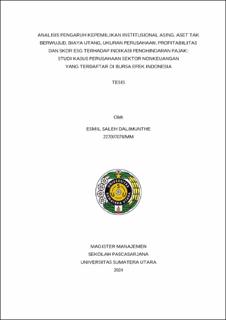Analisis Pengaruh Kepemilikan Institusional Asing, Aset Tak Berwujud, Biaya Utang, Ukuran Perusahaan, Profitabilitas dan Skor ESG terhadap Indikasi Penghindaran Pajak: Studi Kasus Perusahaan Sektor Nonkeuangan yang Terdaftar di Bursa Efek Indonesia
Analysis on the Effect of Foreign Institutional Ownership, Intangible Assets, Cost of Debt, Firm Size, Profitability and ESG Score on Indication of Tax Avoidance: A Case Study on the Non-Financial Sector Companies Listed on the Indonesia Stock Exchange

Date
2024Author
Dalimunthe, Esmil Saleh
Advisor(s)
Fachrudin, Khaira Amalia
Nasution, Fahmi Natigor
Metadata
Show full item recordAbstract
Tax avoidance is a complex issue which becomes very important in many countries’ fiscal policies. The objective of this research is to analyze the effect of some indicators and a company’s performance in the ESG (Environmental, Social, and Governance) aspects on the indication of tax avoidance in Indonesia. Financial data and ESG score are obtained from LSEG Refinitiv database. The population is the companies in the non-financial sector listed on the IDX (Indonesia Stock Exchange) in the period of 2019–2023 while the sample are taken by using purposive sampling technique. Panel data regression analysis, done by using EViews 13, reveals that Intangible assets, cost of debt, firm size, and profitability have positive correlation with the indications of tax avoidance. On the other hand, foreign institutional ownership and ESG score indicate negative correlation with the indications of tax avoidance. Of these variables, profitability and ESG score have significant effect at α=5% while foreign institutional ownership, intangible assets, cost of debt, and firm size have insignificant effect on indication of tax avoidance. The result of the research suggests that a company which is more profitable tends to get high risk of avoiding tax. On the other hand, a company which has better ESG performance tend to get low risk of avoiding tax. This finding indicates that implementing good ESG can make a company decrease its indication of tax avoidance. Based on this result of the research, the Directorate General of Taxes can consider profitability level and ESG score as the initial indicators to determine the risk level of the corporate tax avoidance in Indonesia.
